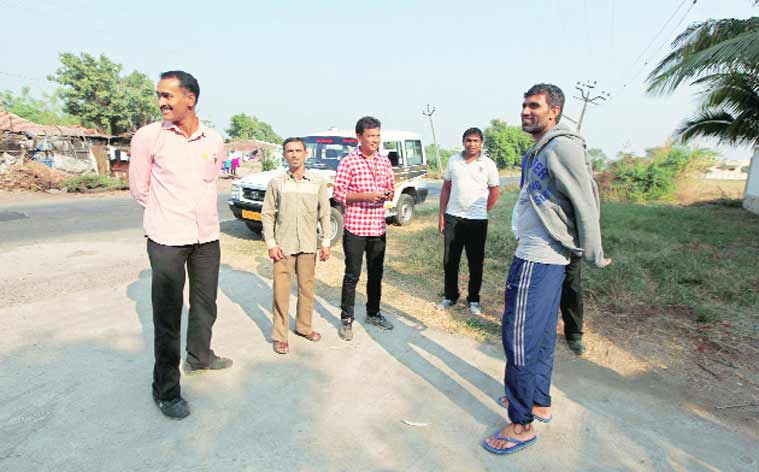Part-built private housing development project on the outskirts of Llanelli, Wales, which was abandoned after the developer went bust. Photograph: Alamy
On the one hand, you have the self-inflating chaos at Westminster, the fever dreams of Jacob Rees-Mogg’s gang and the rehearsed rage of the Democratic Unionists. And on the other, you have the truth nailed by Philip K Dick. “Reality,” he wrote, “is that which, when you stop believing it, doesn’t go away.” So let’s remind ourselves of some reality.
While Tory MPs jostled over a replacement for Theresa May the head of the Confederation of British Industry, Carolyn Fairbairn, warned that millions of pounds were “flooding out” of business investment and into preparing for Britain crashing out of Europe with no deal. Food warehouses said they were running out of space. And auto-parts manufacturer Schaeffler announced that it would shut factories in Plymouth and Llanelli, leaving more than 600 workers facing the dole.
An entire rotten political-corporate regime is crumbling away – and its replacement threatens to be even worse
Even as politicians and the press fantasise about how Britain will leave Europe, big business is already at the departure gate. For Westminster, Brexit is months in the future; for boardrooms making plans, it is the present. Big carmakers have this year halved their investment in new models and factory machinery. The consultancy EY records a 31% slump in the number of foreign businesses setting up headquarters in Britain. Boris Johnson certainly makes good copy – but money talks much louder.
“The banks and insurers are moving, the big pharmaceutical firms are investing abroad,” says Paul Drechsler, who was CBI president until June and now chairs London First. “These trains are leaving the station, and when they leave, they won’t come back.” The country he describes is already shrinking, its job opportunities dwindling, its reputation abroad in eclipse.
This is the real national emergency. An entire rotten political-corporate regime is crumbling away – and its replacement threatens to be even worse. It will be worse, specifically, for those parts of the country, like Llanelli and Plymouth, that voted leave as the ultimate kick against the pricks of a hollow economy and a deaf government.
The succinct definition of our current model comes from the head of the Bank of England. The UK relies, said Mark Carney in 2016, on the “kindness of strangers”. The willingness of overseas investors to keep ploughing in their cash keeps us in the style to which we’ve grown accustomed. Out of all the 28 members of the European Union, the UK is second only to Ireland in its dependence on investment from abroad. Margaret Thatcher’s eagerness to sell off whatever she could get her hands on and her mandarins’ carelessness over ownership has turned us into one of the biggest foreign-capital junkies in the developed world.
On the one hand, you have the self-inflating chaos at Westminster, the fever dreams of Jacob Rees-Mogg’s gang and the rehearsed rage of the Democratic Unionists. And on the other, you have the truth nailed by Philip K Dick. “Reality,” he wrote, “is that which, when you stop believing it, doesn’t go away.” So let’s remind ourselves of some reality.
While Tory MPs jostled over a replacement for Theresa May the head of the Confederation of British Industry, Carolyn Fairbairn, warned that millions of pounds were “flooding out” of business investment and into preparing for Britain crashing out of Europe with no deal. Food warehouses said they were running out of space. And auto-parts manufacturer Schaeffler announced that it would shut factories in Plymouth and Llanelli, leaving more than 600 workers facing the dole.
An entire rotten political-corporate regime is crumbling away – and its replacement threatens to be even worse
Even as politicians and the press fantasise about how Britain will leave Europe, big business is already at the departure gate. For Westminster, Brexit is months in the future; for boardrooms making plans, it is the present. Big carmakers have this year halved their investment in new models and factory machinery. The consultancy EY records a 31% slump in the number of foreign businesses setting up headquarters in Britain. Boris Johnson certainly makes good copy – but money talks much louder.
“The banks and insurers are moving, the big pharmaceutical firms are investing abroad,” says Paul Drechsler, who was CBI president until June and now chairs London First. “These trains are leaving the station, and when they leave, they won’t come back.” The country he describes is already shrinking, its job opportunities dwindling, its reputation abroad in eclipse.
This is the real national emergency. An entire rotten political-corporate regime is crumbling away – and its replacement threatens to be even worse. It will be worse, specifically, for those parts of the country, like Llanelli and Plymouth, that voted leave as the ultimate kick against the pricks of a hollow economy and a deaf government.
The succinct definition of our current model comes from the head of the Bank of England. The UK relies, said Mark Carney in 2016, on the “kindness of strangers”. The willingness of overseas investors to keep ploughing in their cash keeps us in the style to which we’ve grown accustomed. Out of all the 28 members of the European Union, the UK is second only to Ireland in its dependence on investment from abroad. Margaret Thatcher’s eagerness to sell off whatever she could get her hands on and her mandarins’ carelessness over ownership has turned us into one of the biggest foreign-capital junkies in the developed world.
Those investors don’t come here out of charity. Our government competes with others around the world to lure in cash from overseas. But look what inducements we offer. Just weeks before the Brexit referendum, David Cameron’s government published its Invest in the UK brochure, promising “the most competitive” labour costs in western Europe, and “the least strict regulation in the EU.”. Why buy euros when you can have Poundland?
No other country does this. Analysis by Kevin Farnsworth at York University shows that, while all states assure investors they’re competitive locations, Sweden boasts of its “anti-corruption” and “good industrial relations”, while Germany highlights its “efficiency” and “training”. The UK, he writes, “uniquely competes for international capital by offering a package of a low-tax, low-cost, low regulatory business environment”.
Here, whether Conservative or Labour, successive governments have marketed us as the open-all-hours, bargain-basement landing strip off mainland Europe. Until, that is, Britons vote in a referendum to kick away two of the three legs of the post-Thatcherite economic model, namely openness and closeness to the continent. What’s left then is our cheapness – in taxes, in wages and in regulation.
This is Britain in 2018, paying the price for decades of underinvestment and cutprice competition. We have a highly skilled workforce, with almost half of Britain’s young people holding a university degree. And yet in 2014, Charlie Mayfield, former boss of John Lewis and then head of the UK Commission on Employment and Skills, pointed out that over one in five British jobs required only primary-school education. We have a world-class car-manufacturing industry, yet over half of the components in the cars that roll off the lines in Sunderland or Ellesmere Port come from abroad.
This is the point at which the kindness of strangers starts to get rather strained. In a survey this spring, well before the chaos of the past few weeks, EY found that 30% of foreign investors now expect to move money out of the UK after Brexit. The current value of foreign direct investment in the UK is estimated by the government to be over £1 trillion. If even a quarter of that were to move abroad, then £75 billion of assets are already at risk. No wonder the Welsh government is offering sweeteners to Ford to stay at Bridgend. No wonder when Nissan made noises about scaling back at Sunderland, May immediately opened the door of No 10 and offered some kind of deal – although precisely what, the voting public was never told.
You can expect a lot more of this over coming months and years: panicky politicians paying your tax money to grumpy-looking corporate executives. You can expect other countries to try to poach our businesses, just as after the 2016 vote Paris began advertising itself as the ideal post-Brexit corporate headquarters. Their posters read: “Tired of fog? Try the frogs”
You can also expect this government to press even harder the case that Britain is the low-tax, low-wage capital of the rich world. But ministers will get a disappointing response from businesses, believes EY’s chief economist in the UK, Mark Gregory. He thinks multinationals will shift away from using Britain as a stepping stone into Europe and the rest of the world – which is logical, given that any new trading arrangements will take years to settle and will almost certainly not be as smooth as the regime Britain currently has. Instead of building factories to make things to sell to the world, big businesses will instead put their money into storage and showrooms to sell things to Britons. The UK will become, Gregory says, “a warehouse economy: low skills, low productivity and low growth”.
That projection was already a reality for lots of people I met who plumped for Brexit in 2016. They were on minimum wage and had minimum rights and minimum prospects. If Brexit is to be radically changed now, it is those voters – the disenfranchised Labourites, the sod-them-all brigade – whose support is needed. A second referendum, in which well-meaning metropolitans offer those in the Rhondda the status quo, probably deserves to fail. Instead, any remain option will have to come with a worked-out argument about rebalancing power in this country. And that means reshaping the relationship between capital and the rest of us.


 Christopher Woodhead visiting Davenant Foundation School in Essex in 1998
Christopher Woodhead visiting Davenant Foundation School in Essex in 1998
